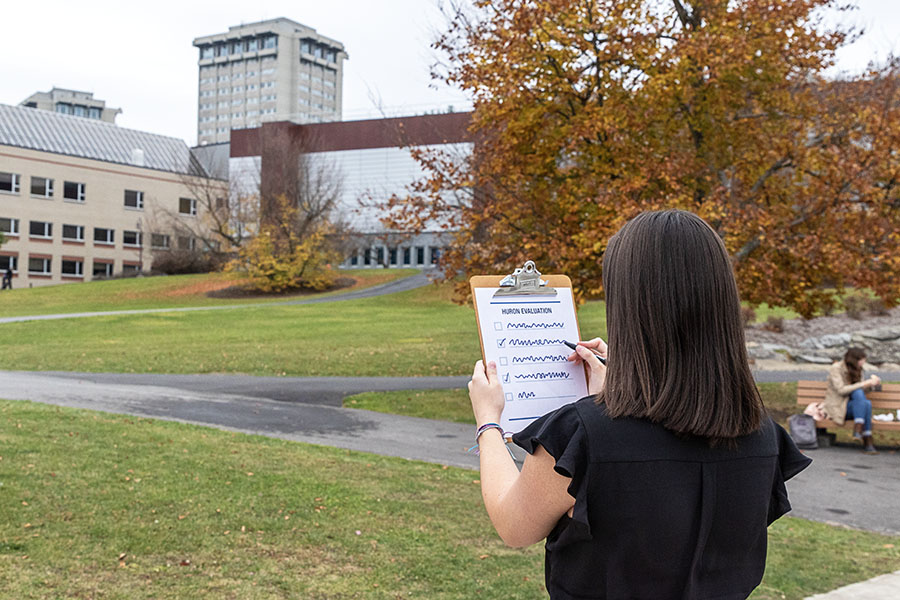Ithaca College started working with the Huron Consulting Group in October to conduct a budget and resource planning study, which aims to address declining enrollment and decrease the budget deficit. Administrators will share a study update in February 2025 and incorporate some of Huron’s suggestions in the Fiscal Year 2026 budget, which is due in May 2025.
Some staff and faculty members feel concerned that the Huron study will recommend cuts to reduce the budget deficit.
President La Jerne Cornish said she wanted to emphasize that the Huron study is not just about cost reduction when she announced the study during the State of the College meeting.
“The college cannot cut its way to success,” Cornish said during the meeting.
Tim Downs, vice president for Finance and Administration and chief financial officer, said Huron will help the college understand its enrollment assumptions to make accurate budget adjustments. Huron will also help the college reduce the deficit by identifying areas to decrease expenses and increase revenue.
Huron
David Gondek, chair of the Faculty Council and associate professor in the Department of Biology, said many faculty members were surprised and concerned when Cornish announced the college was working with Huron, especially because of Huron’s past work with the college.
The college previously hired Huron in 2012 to recommend ways to improve efficiency and reduce costs so the college could avoid raising tuition, room and board. Huron’s suggestions included conducting a staff workforce analysis and closing the physical therapy program’s Rochester Center to fully move the program to main campus.
Through the staff workforce analysis, the college cut 47 position lines, including eight occupied positions, during the 2014–2015 academic year. The college cut 20 staff positions, including filled and unfilled positions, in 2015–2016 and planned to cut 20 more staff positions from 2016–2020 as they became vacant.
After working with Huron, institutions like The New School, the University of Wisconsin Parkside and the University of New Hampshire announced plans to reduce their employees.
“Cuts — that’s what people think of when they hear Huron,” Gondek said. “Right after the October [State of the College] meeting, there was a lot of anxiety about it.”
Gondek said Melanie Stein, provost and senior vice president for Academic Affairs, met with Faculty Council in an executive session after the council reached out to ask for more information. Stein told the council that the Huron study is examining the staff workforce, as the college already examined the faculty workforce through the Academic Program Prioritization process in 2020. Stein also gave an update on the study during the Dec. 3 Faculty Council meeting.
Gondek said he thinks the study can provide a necessary external perspective to help the college determine how to balance the budget. However, he said he feels the study timeline limits opportunities for feedback from the campus community.
Gondek noted that Huron has about four months to analyze college operations and make recommendations to close the deficit. Administrators will include some of Huron’s suggestions in their plan to balance the budget by FY 2028, which Cornish will share during the February Board of Trustees meeting.
Marilyn Dispensa, chair of Staff Council and senior instructional designer in the Center for Faculty Excellence, said many staff members feel unsettled about the study, especially because there has been minimal communication from the college. She said staff have only heard about the study from the State of the College and Oct. 30 Dollars and Sense meetings.
Dispensa said Staff Council sent a letter to Cornish to ask for more information, more transparency and a voice in the study process.
“We’re not saying we have to be at all the meetings … or we need to see drafts of all the reports,” Dispensa said. “We just really want to talk to administration about the process and how we can partner on providing the staff perspective.”
Dispensa said via email that Staff Council has not received an official response to the letter, but Cornish told Dispensa staff members will have an opportunity for input in the study.
Downs said via email that the timeline of the study has streamlined communication between the college and Huron. Downs said via email that campus community members can talk to their divisional leadership to share feedback or ask questions about the study. Downs said via email that the college will unveil a website within the next few weeks for campus community members to share input directly with Huron.
Downs said he recognizes the campus reaction to Huron and wants the community to know that administrators chose to work with Huron after an extensive research and interview process to find a consulting firm. Downs said Huron’s team includes experts with specialized knowledge about topics in higher education, like financial aid and enrollment, who can help administrators understand their options and make informed decisions about how to rebalance the budget.
Downs said the college will not necessarily act on all of the suggestions Huron provides.
The deficit
The college has had a budget deficit for the last three years because it is carrying a higher expense base than it can generate in revenue from enrollment.
The college previously enrolled 1,600 to 1,700 new students each fall, but new student enrollment dropped after the start of the COVID-19 pandemic in 2020. Downs said the college did not decrease its expense base as smaller classes enrolled after the start of the pandemic; administrators expected that the college would return to normalized class sizes, so the college would need the resources included in that expense base. Downs said that after four years of lower enrollment the college expected enrollment to normalize to around 1,400 new students in Fall 2024.
However, 1,128 new students enrolled at the college in Fall 2024. Downs said he projects the deficit will increase to $12 million in FY 2025 because the college missed its enrollment target by about 200 students.
Enrollment
Nationally, undergraduate enrollment increased by 3% this fall according to the National Student Clearinghouse Research Center, but first-year student enrollment dropped by 5% overall from Fall 2023 and by 6.5% at private institutions like Ithaca College.
The U.S. faces an enrollment cliff, as the nation’s number of high school graduates is expected to peak in 2025.
Robert Kelchen, professor and department head of Educational Leadership and Policy Studies at the University of Tennessee, Knoxville, said there is also a declining share of high school graduates who go on to college and older students who go to college after entering the workforce.
Kelchen said private liberal arts colleges are especially struggling to enroll students, as students often perceive them to be more expensive than public colleges even though they may be a similar price after financial aid. Kelchen added that students are increasingly planning to enter pre-professional fields instead of the liberal arts and social sciences.
“Unless they’re sitting with a billion dollar endowment, most small private colleges are running pretty tight budgets right now that enrollment as a whole is either flat or down and costs are rising,” Kelchen said. “So it’s not just a one college thing; it is really most of the sector.”
Downs said Ithaca College had a $373.7 million endowment and $99.2 million in cash reserves in 2023. The college has used some of its endowment and reserves to cover the deficit, but Downs said the college cannot depend on these assets each year or they will eventually deplete.
Downs said via email that Huron will help administrators understand the enrollment assumptions they use to calculate revenue in the budget, including new student enrollment, retention and the discount rate.
Downs said administrators recognize that the college is unlikely to enroll their previous target of 1,400 new students each fall. The college hopes to enroll 1,200 new students each year. However, Downs said he considers 1,100 new students to be a lower guardrail for enrollment, as the college has enrolled at least 1,100 new students each year since 2020. Downs said via email that Huron will help administrators analyze data from the college and the market to make the college’s enrollment assumption as accurate as possible.
Study execution
Downs said that when enrollment sharply declined during the pandemic, the college had to quickly cut $40 million in expenses. The college furloughed or laid off at least 264 staff members in 2020 and 2021.
During the Dollars and Sense presentation, Downs said administrators want to take the time now to understand what the college needs to align the budget and develop a thoughtful plan. Downs said administrators hope the plan will allow them to make smaller changes instead of large course corrections as the market continues changing.
Downs said that since the Huron study started in early October, Huron has been meeting with several college leaders to understand how different sections of campus operate and which components of campus are critical to the institutional mission. Interviews with Huron cover the structure of each organization, the work they execute, any opportunities that the administrators see to increase revenue or decrease costs and challenges the administrators see.
Downs said he and Stein serve as the executive sponsors of the study and meet with the Huron team every week. Huron meets with Cornish every two weeks; with individual members of the steering committee about once a week and as a group once a month; and with the President’s Cabinet and deans of each school a few times.
According to Downs, the study’s base cost is $700,000, but this could increase based on reimbursables like travel fees.
Study focuses
Downs said the college must reduce the budget by $10 million to close the deficit. He said Huron will help the college identify some services that are not critical to the institution. The college may choose to cut these services and their associated staff positions.
“It’s not about doing more with less, it’s … just [that we] may not be able to do things we were in the past,” Downs said. “The whole reason we’re doing this is to make this institution a stronger institution at the end, even if that means we have to be a little bit smaller and we have to offer a little bit less.”
During Dollars and Sense, Downs said the college could reduce staff positions through layoffs, vacancies, or other means. He said administrators do not have a definitive answer yet because they are waiting to see Huron’s analysis and suggestions.
Dispensa said some staff members are concerned that reducing staff positions will add to remaining staff members’ workload and stress.
“Say the student body decreases by 10% or 15%, but that doesn’t always mean that there’s 10% or 15% less work so you need 10% or 15% less people working on it,” Dispensa said. “I think there are some staff that feel like due to cuts in the past of staff within a department, it does put a bigger load on the staff already there.”
Downs said that if the college cuts services and the staff positions associated with them, the workload will not shift to other staff members because the college will stop providing the service.
Downs said the college is also looking for ways to increase its revenue. Stein is leading an academic program review with Hanover Research. One of the study’s objectives is to identify areas for growth in the college’s academic offerings, such as graduate programs. The college added a physician’s assistant program in 2021 and an online, part-time speech language pathology program in Fall 2024.
Downs said Huron is also helping the college reallocate funds already in the budget to pay for rising salary costs and non-salary costs — like food and energy — to avoid further increasing the college’s expenditures. Downs said he is unsure how much the college will have to reallocate.
Downs said administrators are trying to make thoughtful changes that ensure the college’s long-term sustainability, but he recognizes that efforts to reduce the budget deficit will have an impact on the campus community.
“It is our responsibility for the seats we’re in at this point in time that we have this [deficit] and we have to deal with it, and it’s our responsibility to deal with that as popular or unpopular as it may be,” Downs said.
















